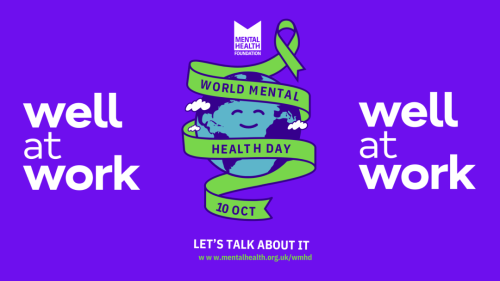World Mental Health Day 2024
By Chloe Hall

It’s now thirty-three years since The World Federation for Mental Health (WFMH) introduced the first World Mental Health Day, which falls on October 10th every year. This year the focus concerns the prioritising of mental wellbeing in the workplace. This subject is central to HFEH Mind’s outreach. Well at Work is a consultancy and training organisation which rolls out programmes to companies all over the UK. It is run by a group of experts who are determined to improve mental health and wellbeing at work. Courses focus on mental health first aid, communication, mindfulness, establishing healthy boundaries, stress and anxiety, and diversity and inclusion.
Why is this year’s theme so important?
Around the world, adults who work spend more time doing their job than any other activity. And that’s not far short of five billion of us. For sixty percent of the world’s population is employed and, on average, they spend approximately sixty percent of their waking hours involved with their work. At least in theory, there are many benefits to being employed. For example, a job is a means to a livelihood, it can inspire a lasting sense of purpose and fulfilment, positive self-esteem, security, a beneficial routine, and even happiness. Yet for far too many people work can transpire to be a less than rewarding experience. Work can all too often negatively affect employees’ health and mental wellbeing. For instance, it can lead to stress, distress, exhaustion, anxiety, personal conflict, burnout, bullying, depression… The list goes on.
It’s not just countless individuals who are affected
Mental wellbeing issues like these are widespread at work. Around the world they affect the overall productivity, efficiency, and work force attendance at countless companies. The WHO estimates that the negative economic impact amounts to one trillion dollars each year. That’s an eye watering figure. Surely it is in everyone’s best interests to address and prioritise mental wellbeing in the workplace. This means that corporate policies regarding duty of care need to enshrine mental health at their core, and they need to be robustly applied. Researchers repeatedly demonstrate that embracing mental wellbeing at work benefits the employees, their companies and their communities.
What issues will World Mental Health Day highlight this year?
The priorities are conditions at work, the management of stress, inclusion, and opportunity. The overall aim is to raise awareness of the importance of mental health at work, promote best working policies and practices, and create workplace cultures in which all employees can feel valued and appreciated. This should mean that people can naturally feel positive at work and contribute in a productive and constructive fashion.
Burnout
One major issue which the WFMH is determined to confront this year is burnout. This is an insidious condition. For while its impact on individuals tends to be relatively gradual, it also tends to take hold before people realise what is happening to them. And, of course, it doesn’t simply affect one person. The whole organisation can end up feeling the impact. This can naturally affect others beyond the workplace, such as friends and family.
What are the symptoms?
Basically, physical and emotional exhaustion. People are likely to feel less motivated, be anxious, narrowly focused, preoccupied, and irritable. Moreover, burnout impacts self-esteem, productivity, and leads to uncharacteristic responses, or no response.
Experts accept that some pressure can actually be beneficial to help focus attention, meet deadlines and improve productivity. But too much pressure leads to stress and is certainly counter-productive and can become destructive. It can lead to serious health problems, often chronic, sometimes with life-long implications.
What are other effects of burnout?
Low staff retention rates, low morale, lower attendance. It means that already busy colleagues must cover and take on additional responsibilities. This can lead to resentment.
Causes of burnout
Root causes include excessive expectations and workload, pressure, a lack of resources, and too few colleagues in a team. Some colleagues may not have a clear understanding of their goals. Managers should clarify the purpose and details of assignments, help their teams to prioritise, and ensure that tasks are assigned to appropriately skilled and experienced colleagues.
Being valued and productive is very important in feeling positive about a workplace role. Likewise, experts recommend inviting colleagues to contribute to evolving projects by explaining their own needs, suggesting resources, and asking questions. If a manager is able to stand back, and empower a team through a sense of ownership and a degree of independence, then colleagues are likely to feel valued, and be more committed in approach.
Sometimes staff may feel unable to switch off when they leave the workplace at the end of each day. This can lead to further tensions at home, and sleep patterns can be compromised. Healthy eating habits can also be eroded. This generates further stress and fatigue. And working from home can exacerbate this issue, blurring personal and professional boundaries.
Prevention
Ensuring that colleagues feel valued is important, as is endorsement of their work. Keeping healthy boundaries, for example, leaving on time, ring fencing breaks and lunch time, while fostering a sense of perspective also help to prevent burnout. Moreover, a warm sense of team spirit, a genuine sense of belonging, and promotion of workplace friendships all help to reduce or manage stress. And of course, running a fair, unbiased management team is vital as well. Colleagues need to feel that they are fairly treated and respected, and have co-ownership of workplace values. That said, companies need to establish support for mental wellbeing in the workplace, with staff trained appropriately in mental health first aid to spot warning signs.
The WFMH is consequently calling for everybody to take responsibility for mental wellbeing in the workplace. That way mental health will become a priority for all, and places of work will be healthier and more productive.
Read further about how to support colleagues with their workplace challenges here.
Good habits
Adopting good workplace habits is a great way to improve mental health at work. These help us to thrive, and have positive emotional, psychological and physical benefits. For example, building good working relationships; taking regular breaks; eating a nutritious lunch; avoiding cutting corners; and communicating openly about personal concerns.
If you’re working from home then you could try some simple activities to relax, for instance, deep breathing exercises, meditation and mindfulness are useful strategies to help refocus. Listening to your senses while concentrating on the environment helps to boost mood.
Conclusion
By devising innovative policies such as flexible hours, by establishing mental health resources and introducing appropriate training, and by promoting open discussion of mental wellbeing, organisations can foster caring workplace cultures which impact positively on morale and so boost enthusiasm, and performance. As Professor Gabriel Ivbijaro, the Secretary-General of the WFMH puts it, ‘Investing in mental health is not just compassionate – it is a strategic business decision which benefits everyone.’
Signposting
For more information about burnout and how it can impact work, and how to stop sabotaging yourself at work, see here.
There’s a lot of advice and help online for anyone who is finding things difficult. You could try looking at one or more of these sources of information:
For businesses:
Well at Work is a training & consultancy business that provides mental health and wellbeing programmes to private and public sector organisations across the UK.
We’re a team of mental health experts, with a passion for improving mental health and wellbeing in the workplace. 100% of Well at Work’s profits support the work of Hammersmith, Fulham, Ealing & Hounslow Mind.
For individuals:
The Circle – Children and Young Peoples Crisis Cafe and Hub
If you live in Hammersmith, Fulham, Ealing or Hounslow then join our Physical and Mental Health Focus Group and help shape the future of mental health.
Posted on: 10th October 2024

















